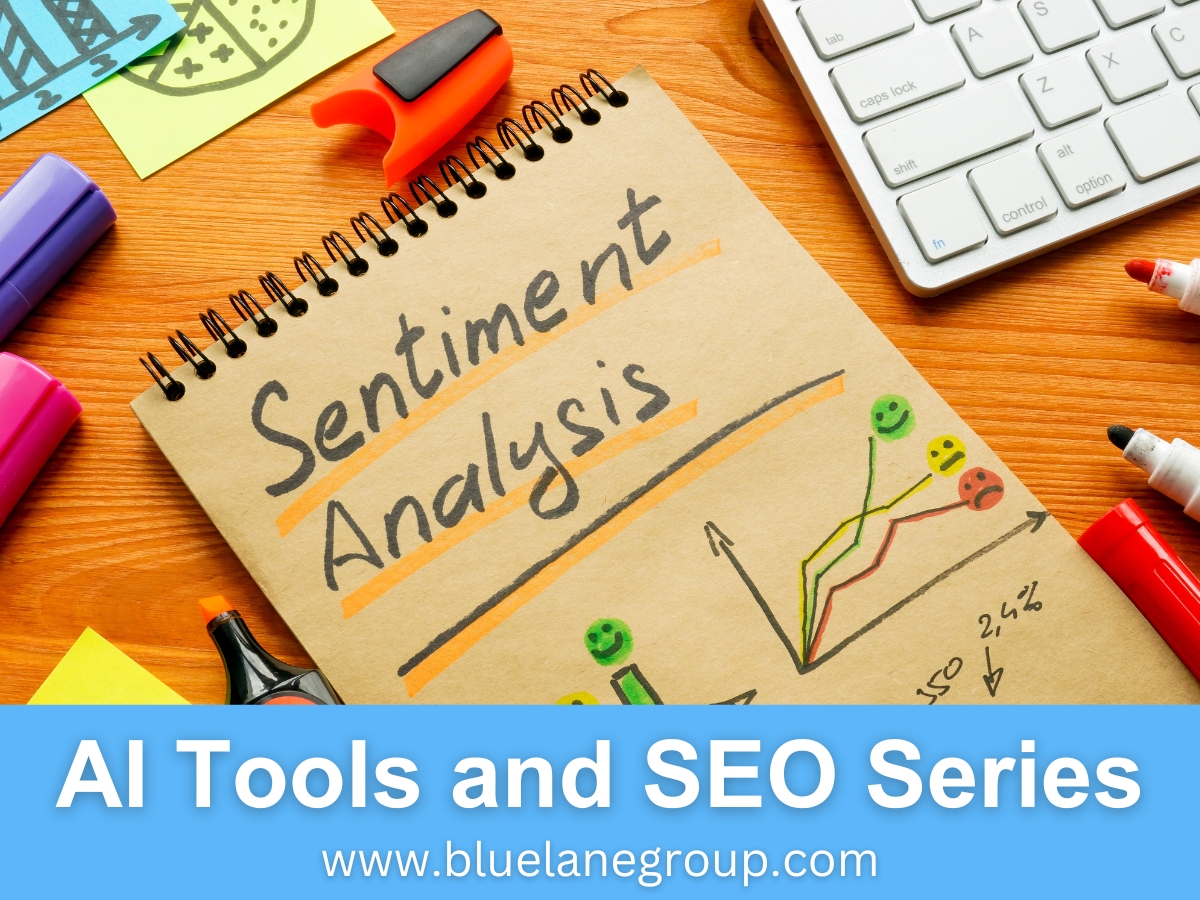Introduction: The Role of Sentiment AI Analysis in SEO
In this enlightening exploration, we dive into the pivotal role of sentiment AI analysis for SEO in driving user engagement and refining your content strategy. We will cover its fundamental methodologies, numerous advantages, and critical position in modern SEO practices.
Quick Scoop – For Those in a Time Crunch
- Sentiment AI analysis for SEO is an innovative tool that uses artificial intelligence to evaluate public opinion and emotional tone in content, thereby improving SEO performance. This technology allows you to fine-tune your content to better resonate with your target audience, optimize keyword utilization, and enhance user engagement. Understanding sentiment AI analysis is a game-changer if you want to make a lasting impact and elevate your SEO strategy.
- In an era where user engagement is critical to online success, sentiment AI analysis provides the nuanced insights necessary for a competitive edge. It empowers you to understand your audience deeper, guiding you in creating content that ranks well and fosters genuine connections.
Welcome to the eleventh article in the Blue Lane Group series on AI Tools and SEO: Building Tomorrow’s Search Strategies Today. This series examines how artificial intelligence is reshaping the field of search engine optimization, offering tools and strategies to boost website rankings, improve user engagement, and make content more relevant.

Disclosure: The digital products mentioned in this article are highly regarded in the marketplace and are endorsed by the Blue Lane Group staff. We may earn a commission at no additional cost if you purchase through the provided links.
Table of Contents

Why Sentiment Analysis Matters for SEO
Understanding user sentiment is crucial for any SEO strategy, as it helps to gauge the effectiveness of your content and keywords in engaging your audience. Tools like Brandwatch and BuzzSumo offer sentiment analysis features that can provide valuable insights into how your brand or content is perceived.
The end goal isn’t just ranking high in search results and ensuring the audience’s positive interaction with your brand. Incorporating sentiment AI analysis for SEO can identify gaps in your content strategy and provide actionable insights for improvement. With more precise analysis, you can tailor your SEO strategies to resonate more strongly with your target audience.
Traditional vs. AI-Driven Sentiment Analysis
Traditional sentiment analysis often relies on manual data collection and basic algorithms, which can be time-consuming and less accurate.
However, AI-driven sentiment analysis tools like Crimson Hexagon and Google Natural Language API employ advanced machine learning algorithms to quickly and accurately assess sentiment from various data points.
The evolution from traditional to AI-driven sentiment analysis in SEO gives marketers a more comprehensive understanding of user sentiment, allowing for a more nuanced and practical approach.
What Sets AI-Driven Sentiment Analysis Apart
AI-driven sentiment analysis brings automation and precision that traditional methods can’t match. For instance, Meltwater and Talkwalker utilize AI to sift through large datasets in real-time, providing immediate insights invaluable for timely SEO adjustments.
The ability to analyze data at scale and in real time sets AI-driven sentiment analysis tools apart. Moreover, these tools can differentiate between various emotional tones, not just positive or negative sentiment, offering a multi-dimensional view that can be crucial for SEO planning.

How Sentiment AI Analysis for SEO Works
Machine learning algorithms that evaluate text data to understand context, tone, and emotion are at the core of sentiment AI analysis for SEO. Tools like SEMrush and TextBlob can analyze reviews, social media chatter, and even competitor content for viewing.
This information is then processed and translated into actionable insights that can inform various elements of an SEO strategy, such as keyword selection, content creation, and even backlink strategy. The insights gained through AI analysis can be transformative, offering a more targeted and practical approach to SEO.
The Algorithms Behind Sentiment Analysis
The science of sentiment AI analysis for SEO is rooted in complex machine learning algorithms capable of not just keyword spotting but understanding context, tone, and nuance.
Tools like Google Natural Language API and Crimson Hexagon use sophisticated natural language processing (NLP) algorithms to dissect the structure and meaning of text.
Unlike fundamental keyword analysis, these algorithms can understand sarcasm, urgency, and other complex human emotions, providing a more rounded view of public sentiment that can be invaluable for SEO.

Key Features in Sentiment AI Analysis Tools
When considering a sentiment analysis tool, key features include real-time analysis, scalability, and the depth of sentiment being analyzed. Advanced tools like Brandwatch and Talkwalker offer these features, including trend analysis and competitor monitoring.
These key features allow marketers to react quickly to shifts in public sentiment, make informed SEO decisions, and maintain a competitive edge in their industry.
Textual Sentiment Analysis for SEO
Textual sentiment analysis focuses primarily on written content like reviews, blog posts, and social media comments. SEMrush and TextBlob specialize in analyzing text data to provide insights into customer sentiment.
This information can then be used to refine keyword strategies, optimize content, and improve meta-descriptions for SEO. Textual sentiment AI analysis for SEO can be particularly useful for content marketers, as it helps to create more resonant and compelling content.

Real-time Monitoring of Public Sentiment
One of the most significant advantages of AI-driven sentiment analysis is the ability to monitor public sentiment in real time. Tools like BuzzSumo and Meltwater offer real-time analytics features that alert you when there’s a notable change in public opinion.
This real-time monitoring is invaluable for quick SEO strategy shifts, especially in response to current events or market trends. Real-time insights mean you can adapt your strategy on the fly, capitalizing on positive sentiment or mitigating negative trends as they happen.
AI and NLP Technologies in Sentiment Analysis
Artificial Intelligence (AI) and Natural Language Processing (NLP) are the backbone technologies in modern sentiment analysis tools. Companies like Google with their Natural Language API, and IBM with Watson Tone Analyzer employ these advanced technologies to understand the intricacies of human language.
AI and NLP can decipher context, idiomatic expressions, and even the tone of voice in text, providing a depth of analysis crucial for effective SEO strategies. As a result, marketers can gain more accurate insights into public sentiment, enabling more targeted and impactful SEO planning.

Case Studies: Success with Sentiment AI Analysis for SEO
Various companies have successfully leveraged sentiment AI analysis to boost their SEO efforts. For instance, a case study involving BuzzSumo showcased how a brand could identify critical influencers in their industry and adjust their SEO strategy for better reach and engagement.
Similarly, Brandwatch has helped companies measure the impact of various marketing campaigns on public sentiment, informing future SEO actions. These success stories underline the efficacy and potential of employing sentiment AI analysis for SEO.
Increasing Site Traffic with Positive Sentiment
Positive sentiment can significantly impact your SEO rankings. Tools like Meltwater and Talkwalker help identify the kind of content that elicits positive reactions from the audience.
By creating such content and optimizing for relevant keywords, businesses can improve their search rankings and drive more traffic to their site. Understanding what sparks positive sentiment among your audience and leveraging that in your SEO strategy can lead to more clicks, higher engagement, and, ultimately, better ROI.
How Negative Sentiment Affects SEO
Negative sentiment can harm your SEO strategy, often leading to high bounce rates and poor user engagement. Platforms like SEMrush and Crimson Hexagon can provide insights into the sources and causes of negative sentiment.
Once identified, brands can take proactive measures like content adjustments or public responses to mitigate the damage. Monitoring for negative views should be a regular part of your SEO strategy, as prompt action can prevent long-term damage to your search rankings.

Challenges in Implementing Sentiment AI Analysis
Implementing sentiment AI analysis for SEO isn’t without its challenges. First, there’s the complexity and cost of the technology involved.
Tools like Google Natural Language API and IBM Watson Tone Analyzer can be expensive and require some technical expertise. Second, the accuracy of sentiment analysis can vary. Even with advanced AI and NLP capabilities, interpreting human emotions and sentiments from text can sometimes be misleading.
Companies must, therefore, exercise caution and perhaps employ human oversight in conjunction with AI tools to ensure more reliable results.
Ethical Considerations in Sentiment Analysis
Using AI for sentiment analysis in SEO raises several ethical questions, including data privacy and potential biases in AI algorithms.
For instance, Meltwater and Talkwalker collect vast amounts of data from social media and other online platforms, raising concerns about user privacy and data exploitation.
Ethical considerations must be addressed to maintain consumer trust and adhere to legal regulations, such as GDPR in Europe or CCPA in California.
Scalability Challenges in Sentiment Analysis
As your business grows, so does the amount of data that needs to be analyzed. Scalability can be a significant challenge when employing sentiment analysis for SEO. While some tools, like Brandwatch and BuzzSumo, offer scalable solutions, others might not be as flexible.
Companies need to ensure that the tools they choose can grow with their needs, both in terms of data volume and complexity of analysis, to make the most out of their SEO efforts.

Future Trends in Sentiment AI Analysis for SEO
The future of sentiment AI analysis for SEO looks promising with several emerging trends. Firstly, we will likely see more advanced algorithms capable of detecting increasingly complex human emotions and intentions.
Secondly, real-time analysis capabilities will become even faster and more accurate. Lastly, as machine learning technologies continue to evolve, expect tools like Crimson Hexagon and SEMrush to offer more personalized SEO recommendations based on sentiment analysis, enhancing the effectiveness of SEO strategies.
How to Choose the Right Sentiment Analysis Tools
Choosing the right tools for sentiment AI analysis in SEO is crucial for achieving accurate and actionable insights. Firstly, consider the tool’s scalability; platforms like Brandwatch and BuzzSumo offer solutions that can adapt as your business grows.
Secondly, assess the accuracy and depth of analysis. Tools like Google’s Natural Language API and IBM Watson Tone Analyzer are renowned for their advanced AI and NLP capabilities.
Finally, consider factors like ease of use, pricing, and the quality of customer support. Balancing these considerations will enable you to select a tool that aligns well with your SEO needs.

FAQ: Your Top Questions on Sentiment AI Analysis for SEO Answered
Questions about sentiment AI analysis for SEO often revolve around its effectiveness, implementation challenges, and ethical considerations.
Products like Meltwater and Talkwalker provide comprehensive FAQs that address most of these questions, offering insights into how their platforms leverage AI to provide accurate sentiment analysis. Whether you’re concerned about data privacy or wondering how to scale your efforts, these resources can offer valuable guidance.
Why is AI Essential in Sentiment Analysis for SEO?
AI is indispensable in sentiment analysis for SEO because it can process and interpret massive amounts of data in real-time. Advanced algorithms and machine learning capabilities in tools like SEMrush and Crimson Hexagon can analyze textual content and detect subtleties in sentiment that a human might miss.
This level of analysis is fundamental in today’s competitive market, where understanding consumer sentiment can make or break your SEO strategy.

What Makes AI-Driven Sentiment Analysis Unique?
AI-driven sentiment analysis offers unique advantages over traditional methods, especially regarding speed, scalability, and accuracy. Utilizing advanced machine learning algorithms, AI tools like Crimson Hexagon and Google’s Natural Language API can analyze vast datasets within minutes, something that would take humans considerably longer.
Moreover, these AI-driven tools can capture nuances and sentiments across different languages and cultural contexts, providing a more comprehensive understanding of public sentiment. All these capabilities make AI-driven sentiment analysis indispensable for modern SEO strategies.
How Does AI Address Ethics in Sentiment Analysis?
Ethics in sentiment AI analysis for SEO is an increasingly important consideration. Many AI tools, including Talkwalker and Meltwater, incorporate ethical considerations into their algorithms. This includes adhering to data privacy norms and ensuring that the AI models are free from biases that could skew sentiment analysis results.
There’s also a growing trend towards “explainable AI,” which aims to make the decision-making processes of AI algorithms transparent. This is a significant step in addressing ethical considerations and ensuring that sentiment analysis is fair and unbiased.

Conclusion: The Future of Sentiment Analysis with AI
Sentiment analysis is undergoing a transformative shift ushered in by the capabilities of artificial intelligence. Integrating more sophisticated AI algorithms and machine learning models will make sentiment analysis faster and more accurate as we move forward.
The technology has the potential to delve deeper into the intricacies of human emotion and cultural nuance, thereby offering insights that are more actionable than ever before. Ethical considerations will continue to play a critical role as this technology evolves, ensuring that it’s implemented in a manner that is both responsible and transparent.
Overall, the future of sentiment analysis with AI promises to be dynamic, driving significant value across multiple sectors, but most notably in SEO, where understanding consumer sentiment is crucial for success.

You Might Also Like:
If you enjoyed this article and received value from it, check out the other Blue Lane Group articles in the AI Tools and SEO: Building Tomorrow’s Search Strategies Today series:
- Uncover Hidden Opportunities: AI in User Behavior Analytics Tools
- Elevate Your Strategy: The Importance of SEO Optimization
- The Role of AI in SERP Analysis: A Revolutionary Approach
- Transform User Experience: Content Personalization with AI
- Boost Your Site’s Performance: AI in Technical SEO Audits
- Outsmart Your Rivals: AI in Competitive SEO Analysis
- Transform Your Content Strategy: AI-Driven Content Generation Revealed
- AI Link Building: The Secret to Unbeatable SEO
- Breakthrough Technology: Using AI for Image and Video SEO
- Drive More Traffic: Leveraging AI SEO Mobile Strategy
- Drive Engagement: How Sentiment AI Analysis for SEO Works
- Maximize ROI: Using an AI-Driven SEO Dashboard and Reporting Effectively
- Thrive Locally: AI Local SEO Tools You Can’t Ignore
- Ignite Sales: Utilizing AI for PPC Campaigns Strategies
- Amplify Your Reach: The Best Influencer Tools Powered by AI
- Elevate Rankings: AI in Social Media and SEO Strategies
- Optimize Success: Understanding AI Semantic Search for SEO
- Unleash the Power: AI and SEO Strategies Using Machine Learning
- Optimize Conversions: AI and Search Intent Tactics





